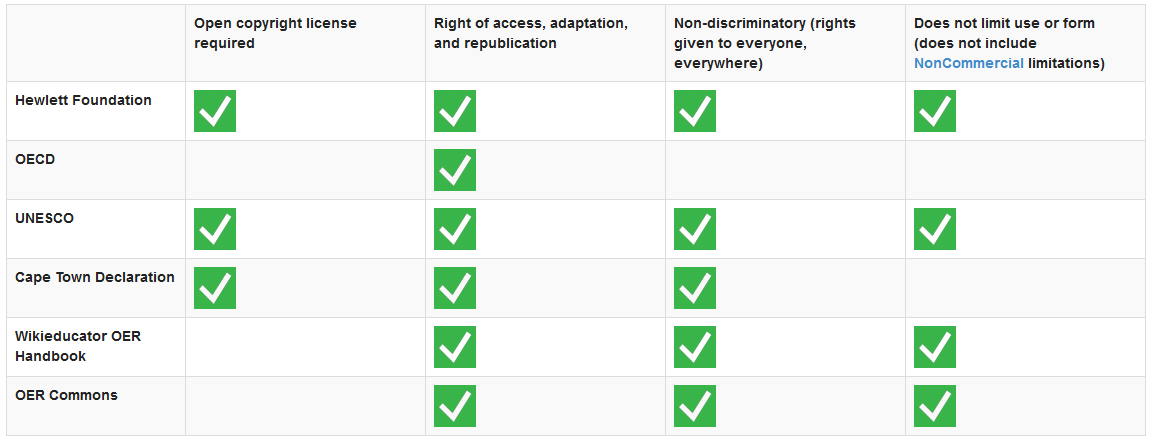2 OER definition
Definition
The term OER (Open Educational Resources) was first defined by UNESCO in 2002 as “any type of educational materials that are in the public domain or introduced with an open license” and can “range from textbooks to curricula, syllabi, lecture notes, assignments, tests, projects, audio, video and animation.”
Creative Commons created the table below to compare different definitions of OER from various sources.

Although many people think of OER and Open Education as generally referring to online-only material and courses, this is not the case. Many open textbooks, for example, are also available in hard copy, or can be printed if a user prefers.
The 5 Rs of Openness
As seen in the table above, OER differs from traditional educational resources in their licensing and permissions. Namely, the “open” aspect of OER can be defined by David Wiley’s 5R Framework.
Retain
the right to make, own, and control copies of the content
Reuse
the right to use the content in a wide range of ways (e.g., in a class, in a study group, on a website, in a video)
Revise
the right to adapt, adjust, modify, or alter the content itself (e.g., translate the content into another language)
Remix
the right to combine the original or revised content with other open content to create something new (e.g., incorporate the content into a mashup)
Redistribute
the right to share copies of the original content, your revisions, or your remixes with others (e.g., give a copy of the content to a friend)
*This material was created by David Wiley and published freely under a Creative Commons Attribution 4.0 license at: http://opencontent.org/blog/archives/3221
A Review of the Effectiveness & Perceptions of Open Educational Resources As Compared to Textbooks.
OER Myth busting
Think OER are too difficult to find or complicated to use? Worried that they will take too much time and effort to implement? Concerned about copyright and intellectual property protection? The OER Policy for Europe has addressed many of these concerns on their OER Myth busting! site.
Additionally, SPARC (the Scholarly Publishing and Academic Resources Coalition) has created a digital resource outlining myths to OER, including:
- Open simply means free
- All OER are digital
- “You get what you pay for”
- Copyright for OER is complicated
- OER are not sustainable
- Open textbooks lack ancillaries
- My institution is not ready for OER
7 Things You Should Know About Open Education: Content
Here is an article found in the Educause Learning Initiative.
Attributions
The OER table at the top of this page has been copied from Creative Commons and is used under a CC BY 4.0 license.
The 5R Framework on this page was retrieved from SFU’s Open Educational Resources research guide and is used under a CC BY 4.0 license.
A Review of the Effectiveness & Perceptions of Open Educational Resources As Compared to Textbooks by https://www.youtube.com/channel/UCcDT… licensed under CC- BY
7 Things You Should Know About Open Education: Content by Educause is used under a CC BY 4.0 license.

